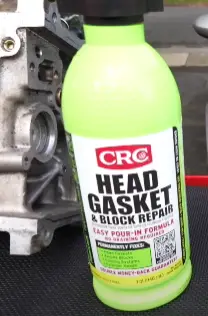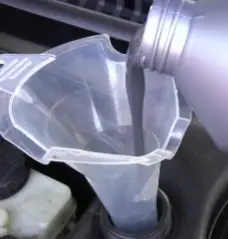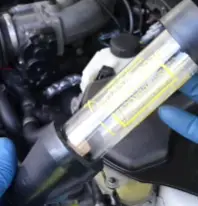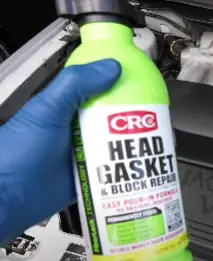Hey there, car enthusiasts and DIY mechanics! If you’re staring down the barrel of a blown head gasket and dreading the hefty repair bill, I’ve got something you need to hear about: Titan Head Gasket Sealer. I’ve been through the wringer with my old Chevy, and this stuff saved me from a wallet-crushing trip to the shop. In this article, I’m diving deep into my personal experience with Titan, breaking down its pros and cons, comparing it to other brands, and sharing maintenance tips to get the most out of it. Trust me, this is a game-changer you’ll want to grab!
My Journey With Titan Head Gasket Sealer

Let me set the scene: my 2003 Chevy Silverado started acting up last summer. White smoke billowed from the exhaust, the engine was running hotter than a July afternoon, and I was topping off the coolant every other day. A quick trip to my mechanic confirmed my worst fears—a blown head gasket. The quote? A cool $2,500. Ouch. I wasn’t ready to shell out that kind of cash, so I started researching alternatives and stumbled across Titan Head Gasket Sealer. Rated highly by mechanics and backed by glowing reviews, it seemed like a lifeline. Spoiler alert: it was.
I ordered the Titan Head Gasket Repair Kit, followed the instructions to a T, and within an hour, my truck was running smoother than it had in months. No more white smoke, no more overheating, and the coolant stayed put. That was eight months ago, and my Silverado’s still holding strong. But let’s get into the nitty-gritty—here’s what I learned about Titan, its strengths, weaknesses, and how it stacks up against the competition.
Pros Of Titan Head Gasket Sealer
Read More: My Thought on Speakman 2251 Vs. 2252 Shower Heads
Titan isn’t just another “mechanic-in-a-can” solution; it’s a polymer-based sealer that’s earned its stripes. Here’s why I’m a fan:
- Polymer-based formula: Unlike silicate-based sealers, Titan uses a high-tech polymer that flexes with aluminum engines, making it ideal for modern vehicles. It sticks like glue without crumbling.
- Works on tough leaks: My Chevy had a nasty coolant-to-cylinder leak, and Titan sealed it tight. It’s designed for both internal and external leaks, which is a big win.
- No radiator flush needed: Some sealers require you to flush your cooling system first, but Titan’s pour-and-go approach saved me time and hassle.
- Compatible with all engines: Whether you’re driving a gas-guzzling V8 or a zippy four-cylinder, Titan works across the board—diesel or gas, old or new.
- Long-lasting results: Eight months in, my truck’s still leak-free. Many users report fixes lasting years, especially for smaller leaks.
- Safe for engine components: Titan’s non-toxic formula won’t clog your radiator or damage rubber seals, which gave me peace of mind.
- Money-back guarantee: The company stands behind its product with a refund policy, so you’re not gambling your hard-earned cash.
- Easy application: I’m no mechanic, but the instructions were clear, and I had it done in under an hour. Just pour, run the engine, and you’re good.
- Works with antifreeze: No need to drain and replace your coolant with water—Titan plays nice with any antifreeze, saving you an extra step.
- Trusted by pros: Mechanics on forums like Reddit and 2CarPros rave about Titan, which boosted my confidence in trying it.
Each of these points made my experience with Titan a breeze. The polymer formula, in particular, stood out because it’s designed to bond with aluminum, which is common in newer engines like my Chevy’s. The fact that I didn’t need to flush my radiator or worry about compatibility was a huge relief, especially since I was working in my driveway with limited tools. And that money-back guarantee? It’s like a safety net for skeptics like me.
Cons Of Titan Head Gasket Sealer
No product’s perfect, and Titan has its quirks. Here’s what I noticed, along with some gripes from other users:

- Higher price tag: At around $130, Titan’s pricier than competitors like Bar’s Leaks or K-Seal, which can cost as little as $20. It stung a bit upfront.
- Not a permanent fix: While it worked wonders for me, Titan’s a temporary solution. Severe leaks may need a proper gasket replacement down the line.
- Application time: You’ll need to run your engine for about an hour after pouring it in, which isn’t ideal if you’re in a rush.
- May not work for massive leaks: If your head gasket’s completely shot, Titan might not cut it. It’s best for small to moderate leaks.
- Oil contamination risk: If coolant’s mixing with your oil, you’ll need Titan’s Oil Stop-Leak too, adding to the cost and process.
- Limited availability: I had to order online since local auto stores didn’t stock it. Shipping took a few days, which was a bummer.
- Instructions must be followed exactly: Skip a step, and you might not get the seal you’re hoping for. It’s not foolproof for rushed DIYers.
- Mixed results on older engines: Some users with high-mileage cars (over 200,000 miles) reported shorter-lasting fixes, though mine held up.
- Potential heater core issues: A few reviews mentioned clogs in the heater core, though I didn’t experience this myself.
- No instant results: Unlike some sealers that claim to work in minutes, Titan takes time to circulate and harden, so patience is key.
The price was my biggest hang-up. Dropping $130 felt like a leap of faith, especially when cheaper options were staring me in the face. But the results justified the cost, and the detailed instructions helped me avoid any missteps. Still, if your engine’s on its last legs or the leak’s catastrophic, you might need to bite the bullet and replace the gasket.
Titan vs. Other Brands
I did my homework before choosing Titan, comparing it to popular brands like BlueDevil, Bar’s Leaks, K-Seal, and Steel Seal. Here’s how it stacks up:
- Titan vs. BlueDevil: BlueDevil’s Pour-N-Go is cheaper (around $40) and user-friendly, but its silicate-based formula can clog aluminum engines. Titan’s polymer base is safer and more effective for modern vehicles.
- Titan vs. Bar’s Leaks HG-1: Bar’s Leaks is budget-friendly ($20-$30) and works well for minor leaks, but it requires a radiator flush and isn’t as durable. Titan’s longer-lasting seal gave me more confidence.
- Titan vs. K-Seal: K-Seal’s “shake, pour, and go” approach is super simple and costs about $25, but it’s less effective for larger leaks. Titan handled my coolant-to-cylinder issue better.
- Titan vs. Steel Seal: Steel Seal’s also pricey (around $70) and comes with a money-back guarantee, but it requires precise application and multiple flushes. Titan’s easier to use and just as reliable.
- Titan vs. ATP AT-205: ATP’s Re-Seal is great for rubber seals but not specifically for head gaskets. Titan’s targeted formula was a better fit for my issue.
- Titan vs. ACDelco Seal Tabs: ACDelco’s tabs are cheap and dealer-approved, but they’re hit-or-miss for head gasket leaks. Titan’s liquid formula sealed my leak more effectively.
- Titan vs. Zecol Mendtite: Zecol’s an older product with some success stories, but it’s hard to find and less versatile. Titan’s broad compatibility won out.
- Titan vs. Thermagasket: Thermagasket’s marketed as heavy-duty but has poor reviews for clogging radiators. Titan’s safer and more trusted by users.
- Titan vs. Liquid Glass: Liquid glass sealers (used in some generics) can cause galvanic corrosion in mixed-metal engines. Titan’s polymer avoids this issue.
- Titan vs. Fel-Pro: Fel-Pro’s a gasket brand, not a sealer, but some mechanics swear by it for replacements. For a quick fix, Titan’s liquid approach was more practical.
Titan’s edge lies in its polymer formula and compatibility with aluminum engines, which many competitors struggle with. While BlueDevil and Bar’s Leaks are cheaper, they’re riskier for modern vehicles. Steel Seal’s a close contender, but its complex application process made Titan the better choice for a DIYer like me.
Maintenance And Tips To Get The Most Out Of Titan Head Gasket Sealer
Using Titan is just the first step—keeping your engine happy takes some TLC. Here’s how I maximized its performance:

- Diagnose the issue first: Before pouring in Titan, confirm it’s a head gasket leak (white smoke, overheating, milky oil). I used a combustion gas test kit to be sure.
- Follow instructions precisely: Mix the sealer with coolant as directed, run the engine for the full hour, and keep the heater on high. Skipping steps can weaken the seal.
- Check coolant levels regularly: Post-application, I check my coolant weekly to catch any new leaks early. It’s saved me from surprises.
- Use Titan’s Oil Stop-Leak if needed: If coolant’s mixed with your oil, add this after the head gasket fix. I did three oil changes to keep my engine clean.
- Monitor engine temperature: Keep an eye on your temp gauge for a few weeks. My Silverado stayed in the normal range, but it’s good to be vigilant.
- Avoid aggressive driving: Hard acceleration or towing can stress the seal. I eased off the gas pedal for a month to let the sealer settle.
- Flush the system periodically: Even though Titan doesn’t require an initial flush, I plan to flush my cooling system every six months to prevent buildup.
- Store properly: If you have leftover sealer, keep it in a cool, dry place. I sealed mine tightly to use for future touch-ups if needed.
- Combine with regular maintenance: Pair Titan with fresh spark plugs and clean filters. My truck runs smoother with these basics covered.
- Consult a mechanic for severe cases: If symptoms persist after using Titan, get a pro’s opinion. It’s a temporary fix, not a miracle cure.
These steps kept my repair holding strong. The combustion gas test gave me confidence in my diagnosis, and following the instructions to the letter ensured the sealer worked its magic. Regular checks and gentle driving helped maintain the fix, and I’m planning a coolant flush soon to keep things pristine.
My Real-World Experience: The Good, The Bad, And The Practical
Read More: My Thought on Speakman 2251 Vs. 2252 Shower Heads
Applying Titan was straightforward, but it wasn’t without its moments of doubt. The price made me hesitate—$130 is a lot for a bottle of liquid! But when I saw my coolant levels stabilize and the white smoke vanish, I knew I’d made the right call. The process took about an hour, including idling the engine in my driveway with the heater blasting (not fun in summer heat). I was nervous about potential clogs, but my heater core and radiator are still working fine eight months later.
One thing I learned: patience is key. Titan doesn’t work instantly like some brands claim. It needs time to circulate and harden, so don’t expect miracles in three minutes. Also, if your oil’s milky, don’t skip the Oil Stop-Leak step—it’s crucial for a complete fix. My biggest regret? Not checking my coolant sooner. If I’d caught the leak earlier, I might’ve saved even more stress.
Comparison Deep Dive: Why Titan Stands Out

Let’s talk numbers. A head gasket replacement can cost $1,500-$3,000, depending on your vehicle. Titan, at $130, is a fraction of that. BlueDevil and Bar’s Leaks are cheaper, sure, but their silicate formulas can wreak havoc on aluminum engines. I read horror stories about BlueDevil clogging heater cores in BMWs and Subarus, which scared me off. K-Seal’s quick fix is tempting, but it didn’t seem robust enough for my truck’s coolant-to-cylinder leak. Steel Seal’s a solid option, but its multi-step process felt like overkill for a DIY job.
Titan’s polymer formula is what sold me. It’s designed for aluminum, which my Chevy’s engine relies on, and it flexes with heat cycles to prevent cracking. Plus, the no-flush requirement saved me an afternoon of wrenching. If you’re weighing options, consider your engine type and leak severity. For modern vehicles with moderate leaks, Titan’s hard to beat.
Maintenance Matters: Keeping Your Engine Happy
Post-Titan, I’ve been religious about maintenance. Checking coolant weekly takes five minutes but catches issues before they escalate. I also swapped out my old thermostat, as a faulty one can stress the sealer. Driving gently for the first month was tough—I love flooring it—but it gave the seal time to set. If you’re using Titan, treat your engine like it’s recovering from surgery. Baby it a bit, and you’ll get more mileage out of the fix.
Frequently Asked Questions (Faq)
K-Seal claims to work in as little as three minutes, but I’m skeptical of those claims. Titan takes about an hour to apply and set, which is still quick compared to a full repair. Speed depends on your engine’s size and the leak’s severity, but Titan’s thorough approach ensures a stronger seal than faster-acting competitors like Bar’s Leaks or BlueDevil.
K-Seal’s silicate-based formula can clog radiators or heater cores, especially in aluminum engines. I read about a BMW owner whose heater core failed after using it. Titan’s polymer formula is safer, but any sealer can cause issues if misapplied. Always follow instructions and flush the system if required.
Yes, if coolant’s mixed with your oil (milky oil is a giveaway). I did three oil changes after using Titan to clear out contamination. Titan’s Oil Stop-Leak helped seal any residual leaks, but fresh oil is crucial to protect your engine’s internals.
Titan needs about an hour of engine runtime to circulate and harden. After that, it stays in the system until you flush it. I’ve left mine in for eight months with no issues, but check your coolant regularly and consider a flush every six months to prevent buildup.
Conclusion: Why You Should Buy Titan Head Gasket Sealer
Read More: My Thought on Speakman 2251 Vs. 2252 Shower Heads
If you’re facing a blown head gasket and your bank account’s screaming for mercy, Titan Head Gasket Sealer is your ticket to relief. My Chevy’s been running like a champ for eight months, and I’ve saved thousands on repairs. It’s not perfect—it’s a temporary fix, and the price stings—but its polymer formula and ease of use make it a standout. Grab Titan, follow the tips I shared, and keep your ride on the road without breaking the bank. You won’t regret it!
